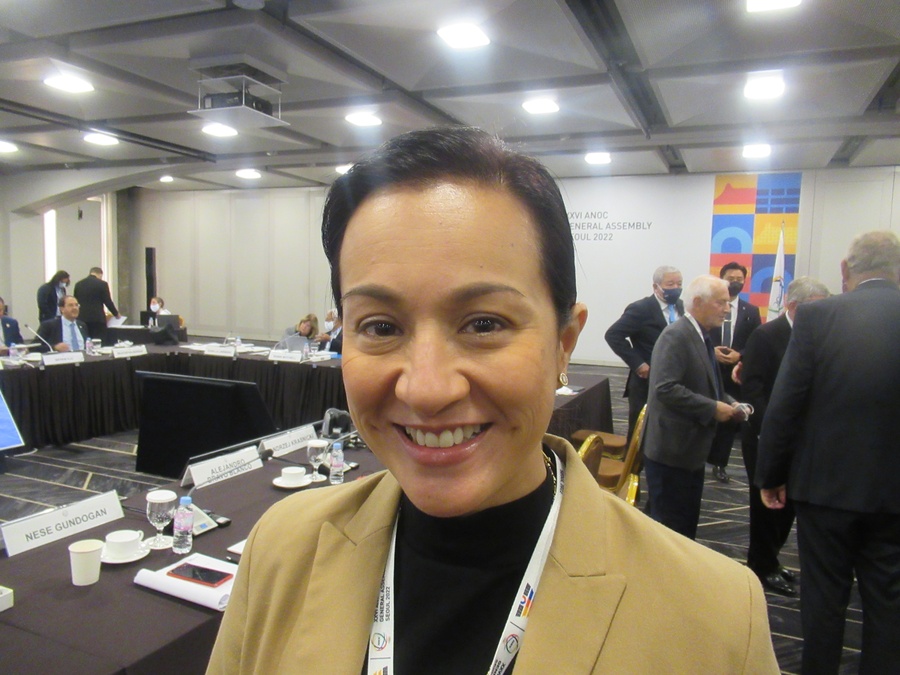Seoul, Korea, October 18, 2022: One of the most prominent women in the Olympic movement, Mikee Cojuangco Jaworski of the Philippines, has described it as “huge” that the Olympic Council of Asia has nominated three women for places on the Executive Council of the Association of National Olympic Committees (ANOC).
Mikee, an Asian Games gold medalist in showjumping at Busan 2002, has served on the ANOC ExCo for eight years and has been nominated for another term by the OCA along with Li Lingwei (China) and Khunying Patama Leeswadtrakul (Thailand) ahead of the ANOC General Assembly on Wednesday.
The other two OCA nominations to represent Asia on the ANOC ExCo are serving members Acting OCA President Raja Randhir Singh (India) and the President of Kazakhstan Olympic Committee, Timur Kulibayev.
Speaking during a break in the ANOC ExCo meeting on Tuesday, Mikee said: “The fact that there are now three women who are being put forward I think is huge for a continent like Asia because we are a very diverse continent.
“The best thing for me at this point is to say that I am grateful that trust is being placed upon us and the assurance that at least I, personally, will be sensitive to the different cultural situations.
“I would think myself as a pragmatic person that believes that there are always solutions that we can find and that we have to try to find those and come together.
“I don’t want to use the word ‘compromise’ because it is not a super positive word but I think that all efforts have to come from all directions, from everywhere, to be able to really make them meaningful.”
Mikee, 48, became an IOC Member in 2013 and was elected on to the IOC Executive Board in 2020. She is a shining light for the women in sport movement for what can be achieved as an athlete, administrator and leader.
Asked if the women in sport movement was making progress, Mikee answered: “Well, we do have the workshops happening in Bahrain soon and hopefully that will help keep things going,” she said, referring to the OCA Gender Equity Seminar in Manama on October 30-31.
“Throughout the Olympic Movement, with the International Federations and the different Continental Associations etc., we still see that a big effort is being made and that should only be an indication to us that there is still a lot of work that needs to be done in this area, even if we are achieving certain numbers that we have never achieved before.
“I have been looking a lot into this and consulting with a lot of people at home who have been working on women in sport and more representation for women. The feedback that I have gotten from them is that we really need to make sure that we have more women who are qualified to do the jobs, that we have both men and women to mentor women so that they can progress through the different areas and different levels of sport and sport administration or even the technical side of it.
“I think that it’s always going to be a work in progress because everything can always improve and be better and I think we are seeing that more and more in spite of having achieved a lot already – a lot more than what was before.
“So, in that sense, I think that progress is being made - but we are also beginning to see how women can not only represent but also impact, so it’s always going to be continuous work just as in every other area.
“I have also begun to see a little bit more the challenges that women would have to go through, especially when we want younger women to be involved in sport. You have these women also wanting to start families and that is something that we can’t get around, we can’t avoid it. We, as women, would like to be able to do all the things that we are able to do, like be mothers and be wives and still represent.
“I think there are many ways that we can do this. It does absolutely involve a lot more effort from women to be able to do these multiple jobs and do them well, but I think that it is not just women who would be deprived of the opportunity to serve but also everybody else to be deprived of being served by these able women.
“So, it’s not something that I really believe we can ask others to adjust for – but it’s just the way it is. These are things that we work through as women and really just the opportunity to be able to be representatives, not of ourselves. We are not here to represent women; we are here as representatives of the movement.”

